Professor Ted Mack
MW 2:00-3:50 MGH 238
This course will be an introduction to modern Japan through its cinema, in which we will use a wide variety of twentieth-century films to discuss a wide variety of topics. Not only will be viewing films in a variety of genres -- documentary, drama, comedy, science fiction, historical, supernatural, avant-garde, and animation -- we will also be discussing topics ranging from the nature of art to the moral questions of nuclear modernity. Although our discussions will be sensitive to the specific nature of film as an expressive medium, we will consider the topics of art, history, society, war, propaganda, tradition, and morality.
H A&S 253 can be used to fulfill the national cinema requirement for the Cinema Studies degree in the Department of Comparative Literature.
The following assignments and schedule are tentative and subject to change.
Texts, which will be made available through electronic reserves, are drawn from a variety of sources, including:
Arthur Nolletti, Jr. and David Dresser, eds., Reframing Japanese Cinema (Bloomington: Indiana University Press, 1992)
Alasatair Phillips and Julian Stringer, eds., Japanese Cinema: Texts and Contexts (London: Routledge, 2007)
Noël Burch, To the Distant Observer: Form and Meaning in the Japanese Cinema (University of California Press, 1979)
Eric Cazdyn, The Flash of Capital: Film and Geopolitics in Japan (Durham: Duke University Press, 2002)
Websites:

|
DATE |
|
|
|
|
|
March 29 |
Introduction: World War II and Film as Propaganda
"Know your Enemy: Japan" (Frank Capra, 1945)
Shimizu Akira, "War and Cinema in Japan" (The Japan/America Film Wars 7-57)
Ueno Toshiya, "The Other and the Machine" (The Japan/America Film Wars 71-93) |
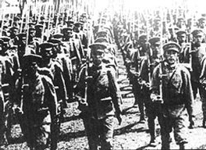 |
31 |
World War II and Film as Reflection
"Fires on the Plain" (Ichikawa Kon, 1959)
William B. Hauser, "Fires on the Plain: The Human Cost of the Pacific War" (Reframing 193-209)
Pauline Kael, "Fires on the Plain (Nobi)" (Kon Ichikawa, 401-404)
Donald Richie, "A Definition of the Japanese Film" (A Lateral View 170-84)
Susan Hayward, "Defining the 'National' of a Country's Cinematographic Production" (French National Cinema 1-16) |
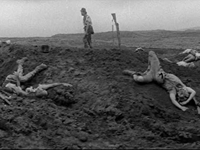
|
April 5 |
Wartime Atrocities and a Discourse of Victimization
"Black Rain" (Imamura Shôhei, 1989)
Michael Kort, "Key Questions and Interpretations" (The Columbia Guide to Hiroshima and the Bomb 81-116) |
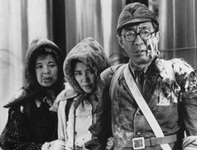 |
7 |
Fears of a Nuclear Modernity
"Godzilla" (Honda Ishirô, 1954)
Yomota Inuhiko, "The Menace from the South Seas" (Japanese Cinema: Texts and Contexts, 102-111) |
 |
12 |
Ozu Yasujirô: Part I
"Late Spring" (Ozu Yasujirô, 1949)
David Bordwell, "Structures, Strictures, and Strategems" (Ozu and the Poetics of Cinema 51-72)
David Bordwell, "Banshun" (Ozu and the Poetics of Cinema 307-12)
Abé Markus Nornes, "The Riddle of the Vase" (Japanese Cinema: Texts and Contexts, 78-89) |
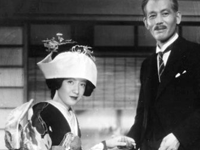 |
14 |
Ozu Yasujirô: Part II
"Tokyo Story" (Ozu Yasujirô, 1953)
David Bordwell, "Towards Intrinsic Norms" (Ozu and the Poetics of Cinema 73-108)
David Bordwell, "Tokyo monogatari" (Ozu and the Poetics of Cinema 328-33)
Kathe Geist, "Narrative Strategies in Ozu's Late Films" (Reframing 91-111) |
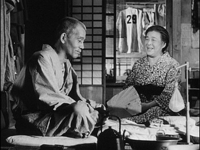 |
19 |
Kurosawa Akira: Part II
"Seven Samurai" (Kurosawa Akira, 1954)
Mitsuhiro Yoshimoto, "Seven Samurai" (Kurosawa 205-246)
D.P. Martinez, "Seven Samurai and Six Women" (Japanese Cinema: Texts and Contexts, 112-123) |
 |
| 21 |
Kurosawa Akira: Part I
"Rashomon" (Kurosawa Akira, 1950)
Mitsuhiro Yoshimoto, "Japanese Cinema in Search of a Discipline" (Kurosawa 8-49)
Mitsuhiro Yoshimoto, "Rashomon" (Kurosawa 182-190) |
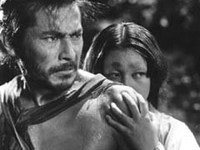 |
26 |
Mizoguchi Kenji: Part I
"Osaka Elegy" (Mizoguchi Kenji, 1936)
Jacques Rivette, "Mizoguchi Viewed from Here" (Cahiers du Cinéma 81, March 1958)
Mori Toshie, "All for Money" (Japanese Cinema: Texts and Contexts, 37-49) |
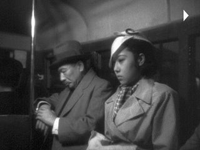 |
28 |
Mizoguchi Kenji: Part II
"Ugetsu" (Mizoguchi Kenji, 1953)
Alexandre Astruc, "What is mise en scène?" (Cahiers du Cinéma 100, October 1959)
Noël Burch, "Mizoguchi Kenji" (To the Distant Observer, 217-46) |
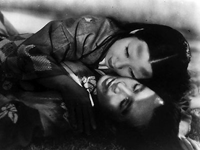 |
May 3 |
The Japanese New Wave: Part I
"Woman in the Dunes" (Teshigahara Hiroshi, 1964)
Mitsuyo Wada-Marciano, "Ethnicizing the Body and Film" (Japanese Cinema: Texts and Contexts, 180-192) |
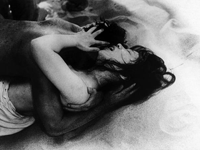 |
5 |
The Japanese New Wave: Part II
"Death by Hanging" (Nagisa Ôshima, 1968)
Maureen Turim, "Rituals, Desire, Death" (The Films of Oshima Nagisa, 61-81) |
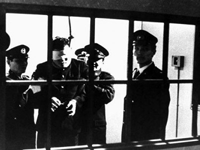 |
10 |
Sexuality, Violence, Politics: the Avant-Garde
"Throw away your Books, Rally in the Streets" (Terayama Shûji, 1971)
Carol Fisher Sorgenfrei, "Introduction" and "Cultural Outlaw in a Time of Chaos" (Unspeakable Acts, 1-50)
Steve Ridgely, "Throw Out Your Books, Let's Hit the Streets" (The Poetics of Terayama Shûji, 180-212)
|
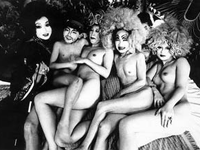 |
12 |
Violence and Genre
"Battles without Honor and Humanity" (Fukasaku Kinji, 1973)
Richard Torrance, "The Nature of Violence in Fukasaku Kinji Jingi naki tatakai" (Japan Forum 17:3, 389-406)
|
 |
17 |
Japanese Film Abroad: Part I
"Kwaidan" (Kobayashi Masaki, 1965)
Lafcadio Hearn, "The Reconciliation" from Shadowings (1900)
Lafcadio Hearn, "Yuki-Onna" and "The Story of Mimi-Nashi-Hoichi" from Kwaidan: Stories of Strange Things (1904)
Lafcadio Hearn, "In a Cup of Tea" from Kottô: Being Japanese Curios, with Sundry Cobwebs (1902)
|
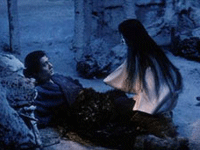 |
19 |
Japanese Film Abroad: Part II
"Tampopo" (Itami Jûzô, 1985)
Charles Shiro Inouye, "In the Show House of Modernity" (Word and Image in Japanese Cinema, 126-48)
Michael Ashkenazi, "Food, Play, Business, and the Image of Japan in Itami Juzo's Tampopo" (Reel Food, 27-40) [Incomplete -- not required reading] |
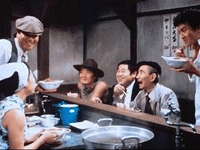 |
24 |
Documentary: Part I
"Tokyo Olympiad" (Ichikawa Kon, 1965)
Eric Cazdyn, et al., "Tokyo Olympiad: A Symposium" (Kon Ichikawa, 315-338)
Satô Tadao, "Tokyo Olympiad: A Feeling of Richness in the Midst of Loneliness" (Kon Ichikawa, 129-133) |
 |
26 |
Documentary: Part II
"The Emperor's Naked Army Marches On" (Hara Kazuo, 1987)
Laura Marks, "'I Am Very Frightened by the Things I Film'" (Touch, 41-54)
Hara Kazuo, "The Film that Summons God" (Camera Obstrusa, 145-92) |
 |
31 |
MEMORIAL DAY: No Class
Prepare on your own: Anime: Part I
"Akira" (Ôtomo Katsuhiro, 1987)
Ueno Toshiya, "Japanimation and Techno-Orientalism"
Thomas Lamarre,
"Born of Trauma: Akira and Capitalist Modes of Destruction" |
 |
June 2 |
Anime: Part II
"Spirited Away" (Miyazaki Hayao, 2001)
Rayna Denison, "The Global Markets for Anime" (Japanese Cinema: Texts and Contexts, 308-321)
Susan Napier, "Matter Out of Place:
Carnival, Containment, and Cultural Recovery in Miyazaki's Spirited Away" (Journal of Japanese Studies 32:2 [2006] 287-310) |
 |
|
|
|
|
Final Exam: Tuesday, 8 June 2010, 2:30-4:20 MGH 238 |
|
|
|
|
PARTICIPATION: Participation in classroom discussions is central to successful performance in the class. Students must have seen the relevant film before class meetings, read the recommended secondary material, and have written a brief (250-word) reaction paper. Secondary materials are provided to present a variety of responses (primarily academic) to the films. Papers will be submitted at the end of class. Students will be advised during the first meeting concerning how to write appropriate responses.
GRADING: Grades will be determined through a combination of the student's preparation for and participation in discussions (50%), response papers (30%), and a final examination (20%).
STUDY GROUPS: I encourage students to meet outside of class to discuss the films and problems they have encountered in interpreting them.
CHEATING AND PLAGIARISM: The presentation of another's words and ideas as one's own is a serious offense; violations will be dealt with according to the University codes of conduct, which stipulate sanctions up to and including expulsion.





















